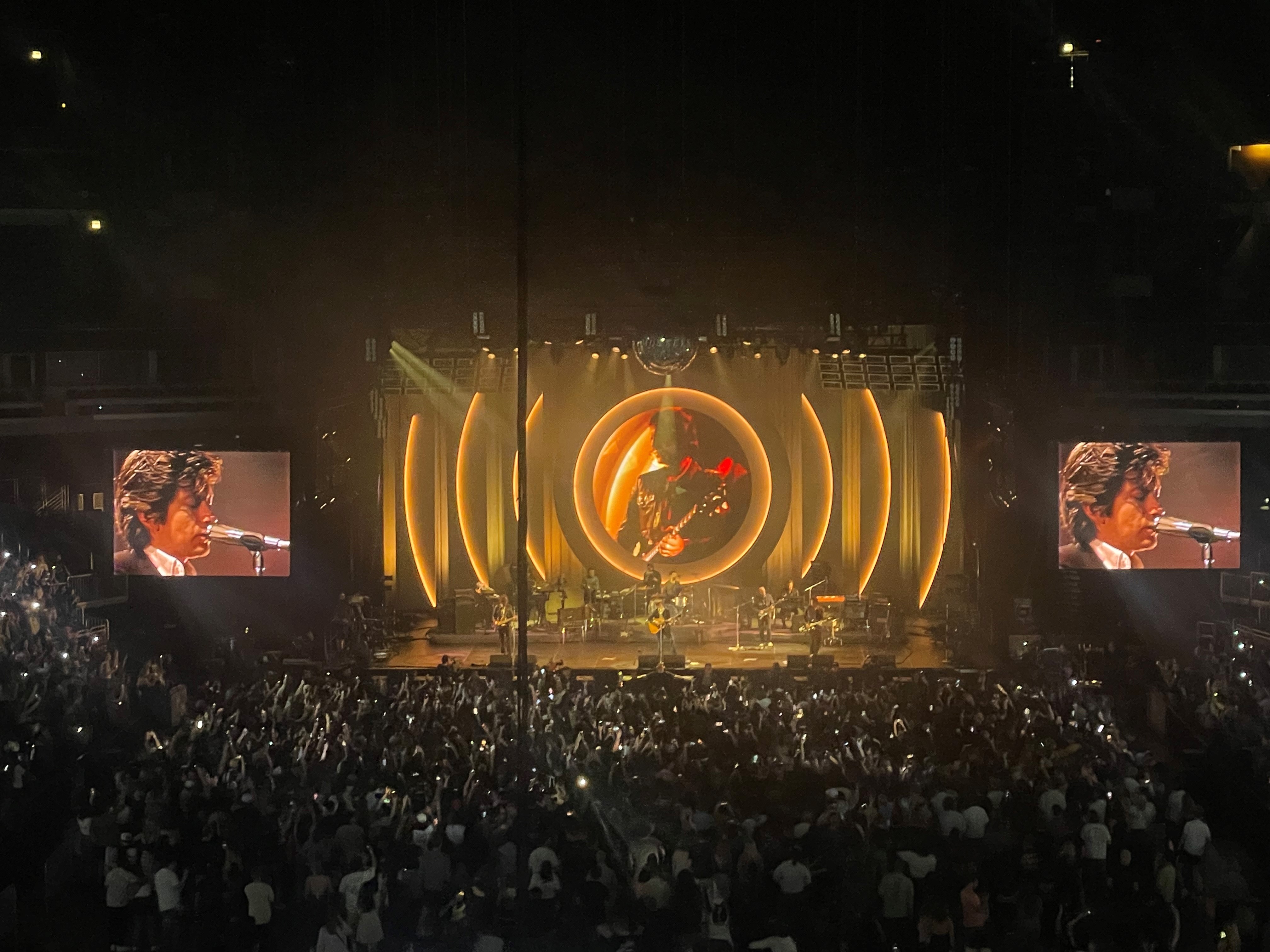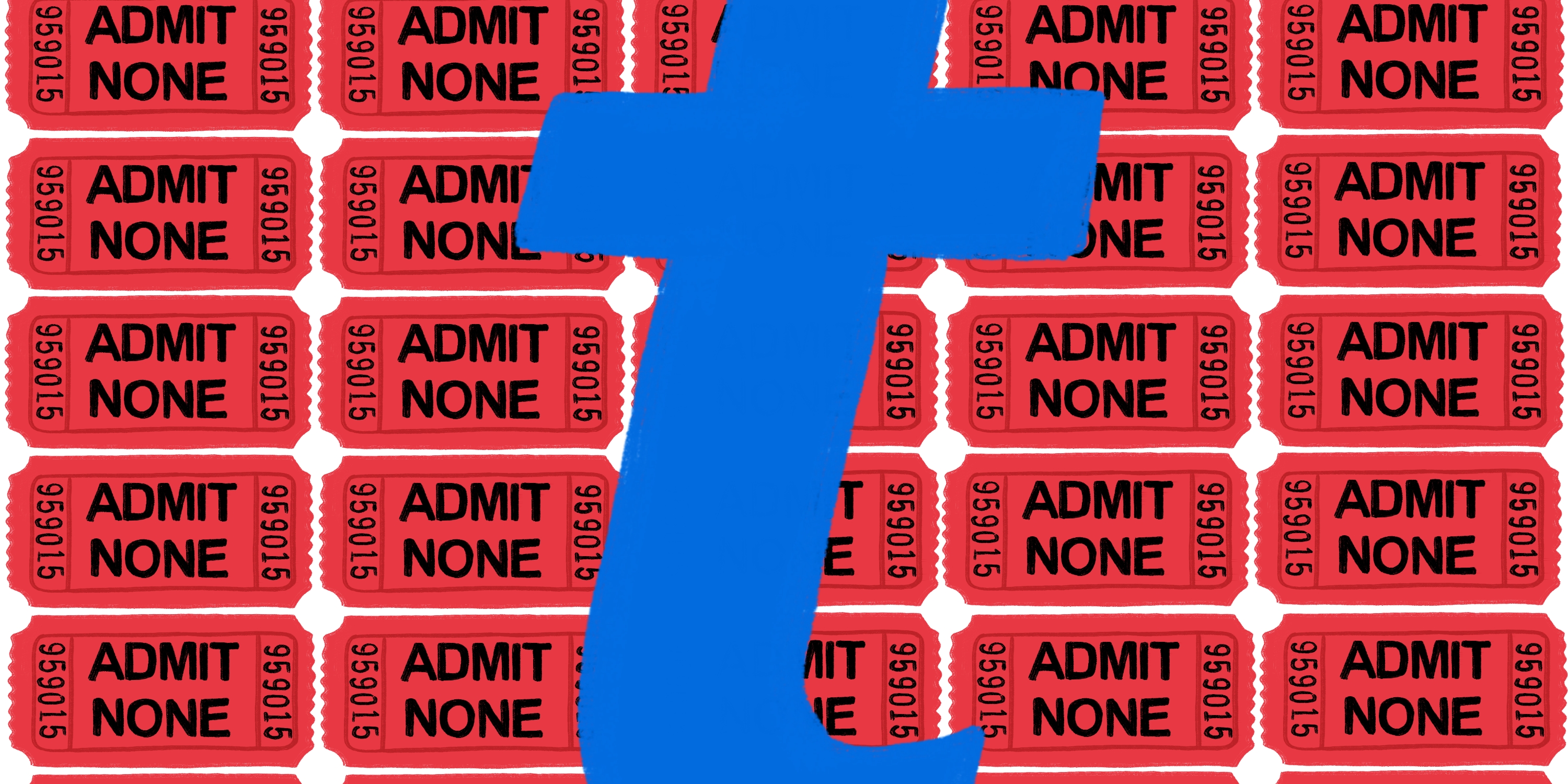The Nuances of the Modern-Day Music Business
The cost of living has risen since the pandemic, but there is one product that has become exponentially more expensive than the natural rate of inflation: concert tickets.

Alex Turner from Arctic Monkeys sings at the United Center on August 27, 2023. The crowd was about 23,000 people. Photo by Gia Clarke, 14 East.
According to Madisen Keavy from CBS News, “Since Ticketmaster merged with Live Nation Entertainment in 2010, ticket prices have skyrocketed and are up by 140%.”
This high inflation of ticket prices is seen through Chicago’s most popular music festival, Lollapalooza, which is coming up this August. In 1991, the admission cost for Lollapalooza was about $31.50. This year, a one-day pass to Lollapalooza starts at $149.
DePaul music industry professor Daniel Makagon said when he was buying tickets in 1990-94, “most tickets were probably $18-25 for any range of seats.”
“I could go to a place called the Universal Amphitheatre, probably spend $18-25, and I could be 15 rows from the stage,” Makagon said.
The reason for the exorbitant inflation rate has to do with the birth of Napster and the popularization of streaming music, which happened around 1999-2001, according to Makagon. Downloading and streaming music was often free and illegal, but everyone was doing it.
“If you’re an artist, you’re not getting any royalties from sales. The record labels aren’t getting any royalties for sales because many people are now downloading music for free,” Makagon said.
Napster, launched in 1999, was an audio file-sharing application where people could upload and stream music for free. Since then, streaming has gotten a lot more popular, and physical mediums for listening to music, like CDs and records, were made obsolete.
When streaming became popular, buying music became unpopular. Artists used to get $15-18 per record sale; they’re now only receiving $0.99 per song on iTunes and other streaming services, according to Makagon. Because of this, ticket prices to live shows have gone up to help pay artists.
“Live music is the place [they’re] gonna be able to make money, and so artists start to charge more because they’re not making any money from sales,” Makagon said.
When artists get signed onto a record label, the record label gives them an advance to be able to record music, but the artists owe that money back. “In other words, you can quit your job at Whole Foods so you can work on music full time and you owe all that money back. It’s a loan,” Makagon said.
The amount of debt artists are in, especially debut artists, makes it hard to control the cost of tickets on the artist’s behalf. They have to charge a higher fee because they’re not making enough money from streaming or selling physical copies, according to Makagon.
Chicago alternative rock band Forgetting Sarah Marshall puts their music on Spotify. Despite having about 1,000-3,000 streams for their more popular songs, Josh Patt, bassist and singer of the band, said most of the money they make are from live shows and merchandising.
“Even if we did make any money from streaming, it definitely would not even remotely be nowhere near as close as what we make from playing shows,” Patt said.
Makagon said artists on Spotify make “about $0.0006 per stream, which is about $0.06 per 100 streams.”
Ticketmaster is not exempt from the cause of high ticket prices, despite the shift from CDs to streaming. Ticketmaster’s merger with Live Nation Entertainment in 2010 also had effects on the rising ticket costs.
Prior to the merger, Live Nation was an event-promotion and venue-operation company, and Ticketmaster was a ticket-sales company. After these companies merged, they now control about 80% of all ticket sales and live-event promotions.
According to Emily Stewart from Vox, because Live Nation-Ticketmaster is such a monopoly, they cannot be held accountable for forcing major artists to use their platform, as well as charging fans high fees. They control a lot of the event promotion and ticket distribution for live events, which makes it harder for musicians to avoid using the monopoly.
Makagon said when buying tickets before streaming, people would physically line up at a record store. When buying tickets, there was still a fee, but Makagon said it was about $1.50. Not like the amount of fees through Ticketmaster. According to Sandra Torres and Francie Swindler from NBC 5, a $66 ticket to see Big Gigantic at the Salt Shed (on Feb. 18, 2023) had $18.25 in fees through Ticketmaster as well as city and state taxes, bringing the total cost of the ticket to $92.
“I feel like whenever I buy tickets, the price is normally almost double the amount I originally intend to pay for,” said Bryen Kilbane, the guitarist and back-up singer for Forgetting Sarah Marshall.
DePaul sophomore Zel Weilandgruber said he went to see Olivia Rodrigo at the United Center, and paid $75 per ticket for nosebleed seats. However, he only got them at a low price because he signed up for the presale.
“They had a queue system, so I signed up for a chance to get in the queue and then I was sitting at my computer for, like, an entire day waiting for it to go through the whole thing,” Weilandgruber said, “It’s full of pain.”
The solutions to regulating the amount of money people are spending on tickets are unclear — how can artists make enough money to pay back the record label and continue to make music, while also regulating the monopoly of Live Nation-Ticketmaster?
Makagon said when buying tickets through Ticketmaster, the flat rate is primarily for the artist. “So, if the ticket price is $75 flat rate, before you pay the fee, almost all of that $75 per ticket is going to the artist. In order for the promoter to make money, and for the venue to make money,” Makagon said, “that’s where the fees end up coming in.”
Because Live Nation-Ticketmaster has a lot of control with the venues, promotions and ticket sales, they can charge whatever they want, essentially with hardly any accountability.
Maggie Rogers, an American singer-songwriter, tried to combat the scammers and bots through Ticketmaster and urged her fans to“come buy a ticket “like it’s 1965,” which meant to physically line up at venues to avoid bots and scalpers, according to August Brown from the LA Times.

Many people line up for Maggie Rogers tickets in the Loop on Friday, April 19, 2024. Photo courtesy of Maggie Schmit.
However, buying physical tickets and waiting for hours with thousands of fans brought up a lot more issues. Maggie Rogers fan Lena An told The Daily Northwestern, “I think it is a bit stressful, and it takes a certain kind of privilege for somebody to take so much time out of their day to go and get a ticket.”
There are downsides to buying physical tickets, as it’s easier to buy tickets online than standing in a physical queue for hours.
A solution seems to be regulating Live Nation-Ticketmaster, but monopolies are and always have been tolerated in the United States despite repeated backlash. Makagon said another solution would be a comeback in buying physical copies of artists’ music rather than digitally streaming, but realistically, “people don’t want to pay for music.”
“I don’t know enough about the nuances of each fee to know where you could scale back. The artists will say the fees are too high, but they can’t just cut their chunk,” Makagon said.
Header by Sofi Martinez




NO COMMENT